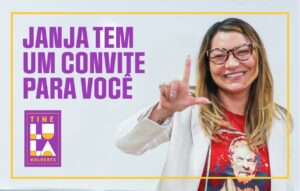Former Brazilian president, Luiz Inácio Lula da Silva, that the world’s biggest challenge will be to allow for the poorest countries to develop and grow applying new technologies to combat hunger and climate change.
“I dream of technological advances which could allow us to produce more food using less land, that are able to emit less greenhouse gases, that can reduce pollution of the waterways and the oceans, but without impairing the growth of poorer countries,” he said during an interview to French daily Libération. “In the discussions, the rich countries sometimes believe we are radicals. But it’s about being fair and about allowing everybody to live with dignity”.
During the interview, which was held in the headquarters of the Instituto Lula in São Paulo, Lula spoke about the Olympics Games, international relations, economy, politics and the corruption scandals that are affecting him and his families.
Throughout the interview, Lula pointed out several times investing in the poor and in wealth distribution policies are the best way out of an economic crisis or for developing a country and eradicating poverty.
“If instead of spending 3 billion to save the financial system the rich countries had invested this money to help the poor countries to build an industrial park, the crisis would have been solved,” he said.
Mentioning social programs in Brazil such as Bolsa Família, credit lines for entrepreneurs and small farmers in Brazil and elsewhere Lula underscored the necessity to maintain social policies because he believes that economic recovery can only come from individuals.
“When you put a little money in the hands of a lot of people, we can restart trade, which restarts industry which, in turn, restarts development … the crisis will not recede until we understand that a strong micro-economy is the basis of a healthy macro-economy”.
Strongly criticising the lack of change in the world order, the United Nations and in the discussions about international economy, Lula also said that Brazil had a place in the world as a leader due to its economic importance and that the Olympics – to be held in Rio de Janeiro in August – and the World Cup – which was held in Brazil in 2014 was part of the country’s new ascension in the world.
About domestic politics in Brazil, Lula said that he is confident that President Dilma Rousseff has the capacity to convince six senators to vote in her favour at the final impeachment vote, allowing the country to return to democratic normality and to continue to advance socially, a needed step since the interim government, backed by Rousseff’s former opposition, are threatening rolling back social and economic policies implemented in the past 13 years.
According to Lula, Rousseff was not allowed to govern by an opposition which boycotted recovery and fiscal control measures since she was re-elected in 2014, deepening the effects of the international crisis on the Brazilian economy.
Still, said Lula, Dilma could return and govern.
“Politics is the art of the impossible,” he said answering a question about whether on her return her opposition would try to block any attempt to rule. “I believe in democracy, in the capacity of convincing others. For Brazil to restore its credibility in the world, it needs to re-establish the mandate of who was democratically elected by 54 million Brazilians”.
Reaffirming that he didn’t regret supporting Rousseff in two presidential campaigns, Lula reiterated his trust in her.
Brushing off the corruption accusations, Lula also said that he trusts Brazilian courts and talked about future elections and once again called for deep political reforms and the engagement of young Brazilians in politics.
In the municipal elections in October he believes that his party could reap good results and about presidential elections in 2018 he said he is ready to run, depending on his health, if he believes recent social advances are at risk.
“… I hope that young spirits in politics emerge [by 2018]. I’ve already been president. But if there is a risk of a setback in our social policies, I will run”.



